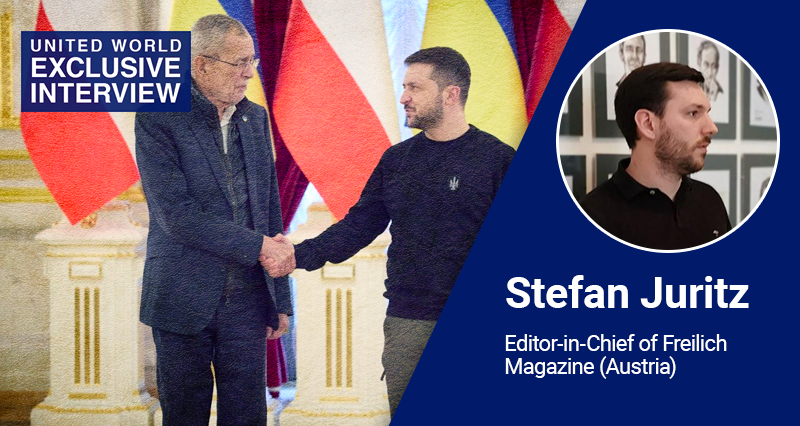By Can Çakır
According to the results of the latest election poll conducted by Unique Research and commissioned by the Austrian news magazine Profil, the Freedom Party of Austria (FPÖ) is in first place with 31%. According to the poll, the FPÖ is ahead of the Social Democratic Party (25%) and Chancellor Karl Nehammer’s Austrian People’s Party (22%).
United World International spoke with Stefan Juritz, Editor-in-Chief of Freilich Magazine from Austria. A graduate of Germanic languages and philosophy at Karl Franzens University, Juritz is working on the history of conservative ideas and identity.
According to the latest survey results by Unique Research, the FPÖ would get more than 30% of the votes in national assembly elections. What is the reason for the increase?
Polls are always taken carefully, but since the autumn the FPÖ Party has been in the lead in all the polls, consistently. The media is already discussing the possibility of Herbert Kickl, leader of the FPÖ, becoming the new chancellor. When Kickl became head of the party, all sides were still claiming that the FPÖ could not take part in the government. That is now changing. Only a short time ago, August Wöginger, parliamentary leader of the Austrian People’s Party (ÖVP), declared that the ÖVP no longer rules out the possibility of a coalition with the FPÖ.
Naturally, the FPÖ is benefiting from the current crises: Austria is facing an inflation, which is automatically increasing discontent among the people. The FPÖ distinguishes itself from the other parties in many issues, like COVID 19, asylum and sanctions on Russia.
Sanctions on Russia and the Austrian economy
Europe is going through a though time with regard to the conflict in Ukraine and mass immigration. What is the FPÖ‘s policy on these? And how does this policy resonate with the people?
The FPÖ insists on the neutral position of Austria in the Ukraine conflict. Instead of delivering new arms to Ukraine, the FPÖ is calling for peace negotiations. Moreover, the FPÖ has been against sanctions on Russia from the very beginning, saying that they harm the Austrian economy.
Addressing ‘politically incorrect things’
The FPÖ led by Kickl is also pursuing a relatively clear line on migration. The FPÖ calls for an ‘Austria Fortress’ (Festung Österreich) and wants to stop illegal immigration under the guise of asylum. The FPÖ is the only party in Austria that addresses openly the issue of population replacement, that is, the demographic trend of Austrians becoming a minority in their own country in the coming decades.
The FPÖ is obviously polarizing on these issues. It addresses certain things that many say only behind the doors, as these positions are considered not ‘politically correct’.
‘FPÖ opposes arms deliveries to Ukraine’
How does the FPÖ see the European countries’ military support to Ukraine and NATO’s Russia policy?
The FPÖ opposes Austria’s arms deliveries to Ukraine, arguing for Austria’s neutrality. But Austria, as a member of the European Union, is contributing financially to arms deliveries to Ukraine through the European Peace Facility. The FPÖ wants to stop this and repeatedly emphasizes that the majority of Austrians is in favor of neutrality.
Is ‘patriotic transformation’ possible?
The votes of the Rational Rally in France and the AfD in Germany – parties supposedly close to the FPÖ – seem to have increased. Is that a sign that these parties will governments in coming times?
Difficult to predict. The FPÖ’s past involvements in government have failed for various reasons, but still managed to break through the cordon sanitaire. I think, at any rate, the FPÖ must not compromise too much on the core issues. In this way the FPÖ could be a model for other right-wing parties.
Especially France and Germany are the two central states in Europe when it comes to European Union politics. I personally think that polarization in European societies will continue to increase over the next few years. But whether a patriotic transformation takes place remains to be seen.

















Leave a Reply